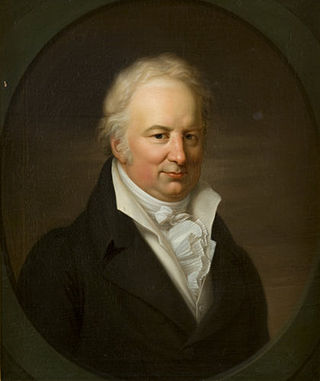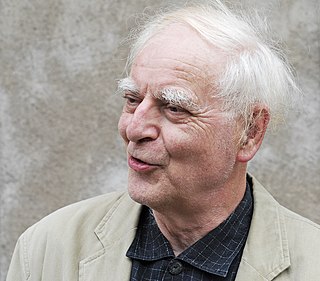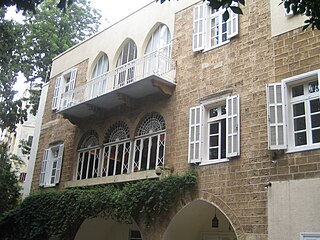
Karl August Böttiger was a German archaeologist and classicist, and a prominent member of the literary and artistic circles in Weimar and Jena.

Weimar is a city in the German state of Thuringia, in Central Germany between Erfurt to the west and Jena to the east, 80 km (50 mi) southwest of Leipzig, 170 km (106 mi) north of Nuremberg and 170 km (106 mi) west of Dresden. Together with the neighbouring cities of Erfurt and Jena, it forms the central metropolitan area of Thuringia, with approximately 500,000 inhabitants. The city itself has a population of 65,000. Weimar is well-known because of its cultural heritage and importance in German history.

Carl Gustav Adolf von Harnack was a Baltic German Lutheran theologian and prominent Church historian. He produced many religious publications from 1873 to 1912. He was ennobled in 1914.

The Goethe-Institut is a non-profit German cultural association operational worldwide with 159 institutes, promoting the study of the German language abroad and encouraging international cultural exchange and relations. Around 246,000 people take part in these German courses per year.
The Society of Authors (SoA) is a United Kingdom trade union for professional writers, illustrators and literary translators, founded in 1884 to protect the rights and further the interests of authors. In 2020 membership stood at over 12,000.

Weimar Classicism was a German literary and cultural movement, whose practitioners established a new humanism from the synthesis of ideas from Romanticism, Classicism, and the Age of Enlightenment. It was named after the city of Weimar, Germany, because the leading authors of Weimar Classicism lived there.

Adolf Muschg is a Swiss writer and professor of literature. Muschg was a member of the Gruppe Olten.

The Goethe-Medaille für Kunst und Wissenschaft is a German award. It was authorized by Reichspräsident Paul von Hindenburg to commemorate the centenary of Johann Wolfgang von Goethe's death on March 22, 1932. It consists of a silver, non-wearable medal.

Johann Wolfgang (von) Goethe was a German polymath and writer, who is widely regarded as the greatest and most influential writer in the German language. His work has had a profound and wide-ranging influence on Western literary, political, and philosophical thought from the late 18th century to the present day. Goethe was a German poet, playwright, novelist, scientist, statesman, theatre director, and critic. His works include plays, poetry, literature, and aesthetic criticism, as well as treatises on botany, anatomy, and color.

Friedrich Johann Justin Bertuch was a German publisher and patron of the arts. He co-founded the Weimar Princely Free Drawing School with the painter Georg Melchior Kraus in 1776. He was the father of the writer and journalist Karl Bertuch.

Erich Schmidt was a German historian of literature.
Heinrich Doring, born Michael Johann Heinrich Döring was a German writer, theologian and mineralogist.

Karl Julius Schröer was an Austrian linguist and literary critic. He was the son of the educator and writer Tobias Gottfried Schröer (1791–1850).
Goetheforschung is a German term originating in the 19th century for the Goethe Movement, centering on both amateur and academic study of the life of Johann Wolfgang von Goethe. Study and research is often done privately and facilitated through Goethe societies such as the Goethe-Institut. Such societies are dedicated to preserving the memory of Goethe in the public consciousness.
Milan Richter is a Slovak writer, playwright, translator, publisher and a former high-ranking diplomat.

The Orient-Institut Beirut (OIB) is one of ten German Humanities Institutes Abroad which belong to the Max Weber Foundation. The OIB was established in 1961 by the Deutsche Morgenländische Gesellschaft and is part of the Max Weber Foundation since 2003. The OIB supports and promotes independent research on the historical and contemporary Middle East and the Arab world in cooperation with researchers and academic institutions throughout the region.

The Schopenhauer Society is a literary and philosophical society devoted to research into the work, life and influence of the philosopher Arthur Schopenhauer (1788–1860). The society was founded in 1911 by the Sanskrit scholar, philosopher and orientalist Paul Deussen and has its seat in Frankfurt. Since 1912, the society has published the Journal of the Schopenhauer Society.
George Guțu is a Romanian philologist, teacher in the Department of German Language and Literature of the Faculty of Foreign Languages and Literatures, University of Bucharest. He is also director of the Paul Celan Center for Research and Excellence and the Master programme "Intercultural Literary and Linguistic Communication Strategies", initiated by the Department of Germanic Languages and Literatures together with other departments of the Faculty of Foreign Languages and Literatures. His academic activity is based on the history of German literature ; German and Austrian contemporary literature; German literature from Romania, cultural inter-referentiality in Central and Southeast Europe, particularly in Bukovina, poetics, literary theory, translation, the history of German studies and guidance for PhD students. His research domains are the history of German literature; comparative literature; German literature from Romania; cultural inter-referentiality; imagology; the history and aesthetics of reception; theory and practice of translation.

The Freies Deutsches Hochstift is a literary association based in Frankfurt, Hesse, Germany. It is the owner of the Goethe House, the place where the playwright and poet Johann Wolfgang von Goethe was born and spent his early years, which it operates as a museum. The Hochstift also manages the Deutsches Romantik-Museum, a museum dedicated to German Romanticism which opened in 2021.
Chon Young-Ae is a literary scholar and poet from South Korea.













